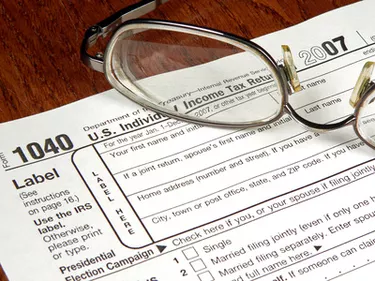
Thousands of Massachusetts residents earn wages in Rhode Island, meaning they're subject to the tax laws of both states. If you live in Massachusetts but commute to a job in Rhode Island, you don't have to pay income taxes on the same earnings to both states -- but you may need to file tax returns in both. Massachusetts allows a credit for income taxes that its residents pay to other states.
States' Tax Rates
Video of the Day
Massachusetts taxes wages at a single rate, which was 5.2 percent as of 2014. Rhode Island has a progressive income tax with three "brackets" that charge taxpayers higher rates as their income rises. As of 2014, the tax rates were 3.75 percent for taxable income up to $59,600, 4.75 percent on taxable income from $59,601 to $135,500, and 5.99 percent on taxable income above $135,500. The rates and income thresholds are the same for single and joint tax filers.
Video of the Day
Withholding and Estimated Payments
Rhode Island law requires employers to withhold state income taxes from all wages paid for work performed in the state. If your workplace is in Rhode Island, your employer won't withhold Massachusetts income taxes from your paychecks. But don't assume that this means you don't owe any Massachusetts tax, or that you can wait to figure it out when you file your tax return. To avoid penalties, Massachusetts taxpayers must file quarterly estimated tax payments if they'll owe more than $400 in taxes after credits and withholding.
State Tax Returns
Residents of Massachusetts must file income tax returns if their gross income is more than $8,000, even if they don't owe any taxes. Massachusetts gross income includes income earned elsewhere. You need to file income tax returns in both states to claim a credit from Massachusetts for state income taxes paid to Rhode Island. In Rhode Island, you should file a nonresident tax return. In Massachusetts, file a resident tax return.
Credit
Massachusetts residents must fill out a worksheet to claim a credit for income taxes they paid to Rhode Island. The worksheet compares the Massachusetts tax on the amount of income you earned in Rhode Island to the tax you actually paid to Rhode Island. The credit you'll receive is the smaller of those two numbers. In other words, if you paid more to Rhode Island than you would have paid to Massachusetts, you won't get a credit for the additional Rhode Island tax. If you paid less to Rhode Island than you would have paid in Massachusetts, you may owe additional tax on that income to Massachusetts.